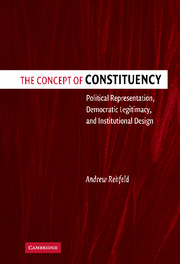 The Concept of Constituency
The Concept of Constituency Book contents
- Frontmatter
- Contents
- List of Tables
- Preface
- PART I CONCEPTUAL FOUNDATIONS: ON CONSTITUENCY AND POLITICAL REPRESENTATION
- PART II HISTORICAL JUSTIFICATIONS: ON THE ORIGINS OF TERRITORIAL CONSTITUENCIES IN THE UNITED STATES
- 3 Justifications and the Use of History
- 4 The English and Colonial Origins of Territorial Constituencies in the United States
- 5 Origins, Part 1: What Territorial Representation Was Not Meant To Do
- 6 Origins, Part 2: Territorial Representation as an Enabler of Democratic Values
- PART III NORMATIVE APPLICATIONS: ON LEGITIMATE REPRESENTATION AND INSTITUTIONAL DESIGN
- Index
6 - Origins, Part 2: Territorial Representation as an Enabler of Democratic Values
Published online by Cambridge University Press: 27 July 2009
- Frontmatter
- Contents
- List of Tables
- Preface
- PART I CONCEPTUAL FOUNDATIONS: ON CONSTITUENCY AND POLITICAL REPRESENTATION
- PART II HISTORICAL JUSTIFICATIONS: ON THE ORIGINS OF TERRITORIAL CONSTITUENCIES IN THE UNITED STATES
- 3 Justifications and the Use of History
- 4 The English and Colonial Origins of Territorial Constituencies in the United States
- 5 Origins, Part 1: What Territorial Representation Was Not Meant To Do
- 6 Origins, Part 2: Territorial Representation as an Enabler of Democratic Values
- PART III NORMATIVE APPLICATIONS: ON LEGITIMATE REPRESENTATION AND INSTITUTIONAL DESIGN
- Index
Summary
But when Americans spoke in the abstract about why representatives were responsible to the local electoral district rather than to the whole people, they were less interested in stressing obedience or accountability than knowledge … American theory had always favored local representation. The doctrine was not devised to resist parliamentary legislation; it was the pragmatic explanation of American constitutional conditions.
– John Philip ReidThere was, as usual, a crowd of folk about the door, but none that Rip recollected. The very character of the people seemed changed. There was a busy, bustling, disputatious tone about it, instead of the accustomed phlegm and drowsy tranquillity. He looked in vain for the sage Nicholas Vedder, with his broad face, double chin, and fair long pipe, uttering clouds of tobacco-smoke instead of idle speeches; or Van Bummel, the schoolmaster, doling for the contents of an ancient newspaper. In place of these, a lean, bilious-looking fellow, with his pockets full of hand-bills, was haranguing vehemently about rights of citizens – elections – members of Congress – liberty – Bunker's Hill – heroes of seventy-six – and other words, which were a perfect Babylonish jargon to the bewildered Van Winkle.
The appearance of Rip, with his long grizzled beard, his rusty fowling-piece, his uncouth dress, and an army of women and children at his heels, soon attracted the attention of the tavern politicians. They crowded round him, eyeing him from head to foot with great curiosity. The orator bustled up to him, and, drawing him partly aside, inquired “on which side he voted?” […]
- Type
- Chapter
- Information
- The Concept of ConstituencyPolitical Representation, Democratic Legitimacy, and Institutional Design, pp. 117 - 142Publisher: Cambridge University PressPrint publication year: 2005


